Back in the Captain's Chair
By gamer_152 10 Comments
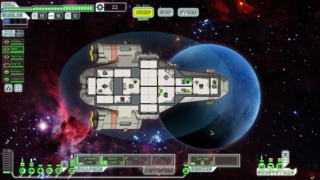
FTL is nothing if not a unique beast. When trying to classify it under any existing category “strategy” or “roguelike” are the best fits, but the game is far from characteristic of these genres. Perhaps more than being defined by any traditional gameplay template, FTL is defined by the common sci-fi themes it attempts to translate into video game form, the sense of being the captain of a lone and solitary ship in the blankness of space and venturing into the unknown to find unusual alien races, innocents in trouble, fantastic technologies, and unforeseen dangers.
There is a sense of control that comes with commanding your crew, and a feeling of empowerment after upgrading your ship with a particularly useful bit of kit and seeing it in action. FTL hinted at the idea that there was much more to be done with procedurally-generated loot-driven games than just producing dungeon crawlers, and at least in my experience it was one of the games most adept at creating emergent narratives. I wanted to tell those stories of how I managed to rack up seven different crew members aboard my vessel, picking them up from remote alien colonies, or how my ship went down in a blaze of glory trying to fight off the rebel fleet. Personally though I found a lot of the flaws of other roguelikes were present in FTL and that the game didn’t have the longevity of many other games of its species.
Glitches in the System
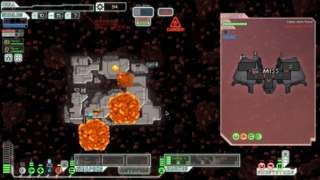
How far you get in the game is largely a product of how lucky you are with the opportunities you get to pick up new crew and ship parts, and how lucky you are in which lethal dangers you just happen to avoid. That’s kind of the thing about venturing into the unknown, there’s only so much you can plan for it when you don’t know what’s coming, and you lack some degree of agency in what happens to you. That goes double when we’re talking about strategy games as opposed to action games.
In something like Spelunky or The Binding of Isaac, even when haven’t gotten anything like the items you wanted during your run there’s still the chance that through your own skills in hand-eye coordination, risk estimation, spacial awareness, etc. you can make it through. Even in many other strategy games, the depth and variety of options often means that the tactical thinker can play off the enemy’s weaknesses and overcome any opposition. FTL however is more about butting equipment against equipment and seeing who comes out on top. Sometimes this is an invigorating experience as you see your lasers, drones, or whatever else you may have bolted onto your hull blazing through the enemy’s defences and wreaking havoc with their systems, but it also means that there’s only so much you can actually do to decide the outcome of a battle. This is a particular problem when the game can be so punishing, especially during the final sector. There is also only so much the game can do in the way of variation.
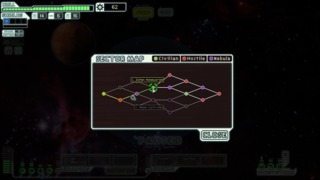
Procedural generation and high difficulty, both traits which FTL possesses, are capable of lending games replayability, and FTL is obviously going for the replayability angle. However, specific story scenarios, also something FTL is full of, generally don’t lend as much replayability and so you end up with a clash of components in the game. The allure of jumping back in to see how far you can get and what kind of situations you’ll encounter invites you to keep hitting "Restart", but there’s only so many times you can see the exact same events in different configurations and it still feel like something new. These aspects also undermine the idea of it really being the unknown you’re venturing into and diminish how emergent the narratives feel. I don’t believe lack of replayability in a game is by default a bad thing, but it was a major influence in how exactly I interacted with FTL in comparison to other games. It’s not just the story though, the combat in FTL easily becomes repetitive, and that might be a genuine problem. The fight system is far from derivative and yet is fantastically easy to pick up as a new player, but part of the reason it was so easy to get a handle on was that it isn’t particularly deep.
When you are in a pinch, battles can get frantic and tense as you rush to put out fires and repair your ship, all the while still trying to hold your own against some marauding pirate vessel or overzealous law-enforcement. A lot of what attacking other ships boils down to however is just aiming at a ship section or two and letting your vessel fire away, maybe changing your target once or twice during the battle. I had so many skirmishes which just consisted of locking on to the enemy shield unit, waiting for my ship to finish wailing on it, collecting my scrap, and leaving. Very fun in the short term, but its not a particularly enduring way to conduct combat. You could argue that perhaps the game could be appreciated as a more passive form of engagement, a fun little program you mess with while the other half of your brain concentrates on listening to a podcast or half-watching a TV show, and some of the time it can be that, but this argument is weakened by the fact that even on “Easy” there is always a point at which the game demands a high level of focus and involvement from the player. FTL Advanced Edition however represents at least a small resurgence for the game, presenting itself as the “definitive” FTL and being offered free to existing players.
Retrofitting
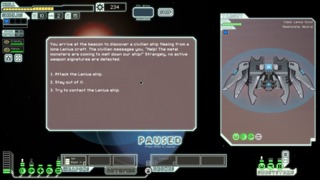
You should know that Advanced Edition doesn’t aim to change any of those aspects of the first game I just talked about, they’re too deeply ingrained in what FTL is. Instead its goals are to expand the content of the original and add a few new features to the game which let you subvert and twist some of the existing rules of play in interesting new ways. There’s a few new events sprinkled throughout the sectors but the stand-out moments of the update come courtesy of the Abandoned Sectors and the species that inhabits them, the Lanius. The Lanius are a technologically-focused people with ships to match. Their vessels are modelled like chrome insects with sleek metal wings stretching out from their fortified hulls, and while like all the races, they can be a useful ally at times, the Lanius are appropriately cold and creepy. Not only are they metal people piloting metal ships in an inhospitable part of the universe, but they are also able to survive without oxygen and drain air from any room they’re stood in. They’re just part of how you can begin to play with those gameplay systems in odd ways.
Some of the other new changes you can make to your ship, besides dropping in a suffocating organic robot, include adding a mind control room, building in hacking facilities, or getting a clone bay. The mind control is exactly what it sounds like, allowing you to distract some poor shmuck on the opposing ship from their assigned task and making them attack the room they’re in. Hacking does something a little different depending on which room of the opposing ship you target with it, but it generally makes ship components do the opposite of what they’re supposed to or stops them functioning for a limited time. For example, you can hack your enemy’s shield unit to make it slowly sap the ship’s shields instead of power them, or hack their medbay to make it hurt crew instead of heal them. You can even hack their hacking module to stop them hacking you.
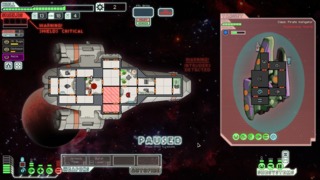
Then there’s the clone bay, which acts as a replacement for your medbay. Obviously, with your medbay gone there’s no readily available treatment for your crew should they become hurt, but if they die the clone bay can resurrect them and will restore just a tiny amount of health to them with each jump. In classic sci-fi fashion the clone bay is too good to be true however. Seeing defeated characters pop back to life in the blink of an eye makes you feel like you’ve cheated death, but each clone comes back with less experience in each station than their predecessor. This isn’t a problem early on, but later into the game it means that if you can’t keep your crew alive you still end up paying a price as valuable extra boosts for certain stations go down the drain. Of course, none of these new tools constitute a complete trump card either. While you can use hacking or clones to try and mess with your enemies, many ships are capable of doing the same to you.
You should keep in mind that these are just the main modifications which you can add to your space-faring vessel, there are plenty of cool new weapons and some other equipment as well like cannons which have a slower cooldown with each firing or AoE guns, and it feels like the developers have made some genuinely creative and fun additions. These new parts successfully adapt more classic sci-fi tropes into gameplay form, and while no one part of your ship is going to be the be-all and end-all in combat, the new ship parts allow you to play with the mechanics in a way that feels like you’re getting one over on the enemy. There are also some other new rules for the gameplay which improve the experience. To mention just a couple, firing at a room on an enemy ship can stun those inside that room, and it’s now possible to save which stations your crew are currently assigned to and hit the “Enter” key later to see them all satisfyingly snap back to their places after they’ve been scrambled.
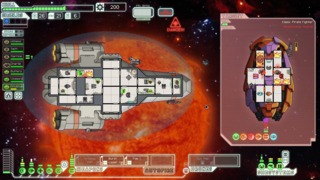
More than any of the new features in themselves however, what’s given me the most enjoyment is just having an excuse to go back and experience all the best things about FTL all over again. Eventually I know I’ll get bored with the game and the sheen of it all will fade just like it did the first time around, but FTL Advanced Edition has been a reminder that one the best things about expansion packs, DLC, and updates is that they’re often not just presenting new something in and of themselves, but that they also offer the chance to once again interact with those fundamental aspects of the game that we enjoyed so much in the first place. Thanks for reading.